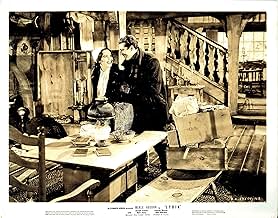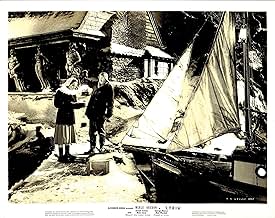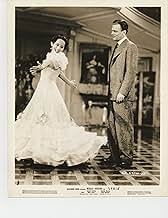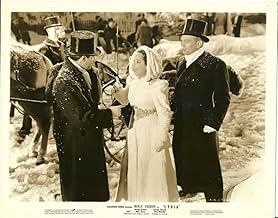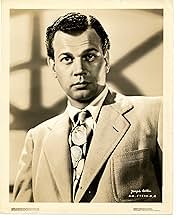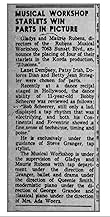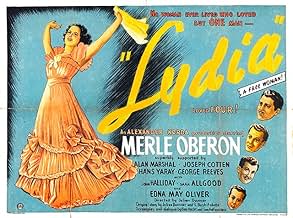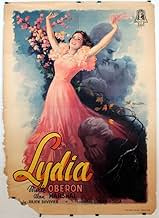Lydia
- 1941
- Tous publics
- 1h 44min
NOTE IMDb
6,3/10
967
MA NOTE
Ajouter une intrigue dans votre langueAn elderly woman reunites with the three men who loved her in their youth.An elderly woman reunites with the three men who loved her in their youth.An elderly woman reunites with the three men who loved her in their youth.
- Réalisation
- Scénario
- Casting principal
- Nommé pour 1 Oscar
- 5 victoires et 1 nomination au total
Hans Jaray
- Frank
- (as Hans Yaray)
Evelyn Beresford
- Sarah's Guest
- (non crédité)
Tyler Brooke
- Vaudeville Singer
- (non crédité)
Frank Conlan
- Old Ned
- (non crédité)
Harry Cording
- Hotel House Detective
- (non crédité)
Hal K. Dawson
- Hotel Desk Clerk
- (non crédité)
Jack Deery
- Ball Guest
- (non crédité)
Paul Everton
- Sarah's Guest
- (non crédité)
Jesse Graves
- Michael's Servant
- (non crédité)
Bobbie Hale
- Bar Patron
- (non crédité)
Gertrude Hoffman
- Mrs. Fairfield
- (non crédité)
Avis à la une
"Lydia" from 1941 is a remake of Jacques Duvivier's 1937 'Un Carnet De Bal.' It retains the same plot and here is remade by Duvivier himself.
Lydia MacMillan (Merle Oberon) is an old but still vital single woman who is visited by four ex-suitors: Michael (Joseph Cotton), Hans (Frank Andre), and Bob (George Reeves) who reminisce with her about the old days and how much they all loved her and wanted to marry her, and how, one way or another, it just didn't work out.
It turns out that Lydia, from a good Boston family, only had one great love, Richard (Alan Marshal), who, after a few days together (during which I think we are to assume she lost her virginity) takes off in his boat. He leaves her a "Dear Jane" letter, stating that he'll be back after he clears things up with a woman who "has a claim on him." He gives her his grandmother's wedding ring and says he will keep sending her rings until he returns. She hears from him sporadically but she never sees him again.
She can really never let go of her love for him, so she remains single, and devotes herself to her work with blind children, who attend a school she set up.
In 'Un Carnet de Bal," the character is widowed and wonders how her life would have been had she married the other men who were in love with her, the men who danced with her one night that changed her life forever.
The angle of "Lydia" is a little different and probably a little deeper. But it's still a film about nostalgia, youth, and disenchantment.
Edna Mae Oliver plays Lydia's grandmother, and she's wonderful in this, her last film. She died the following year at the age of 59. People probably thought she was 75.
Merle Oberon gives a lovely performance as Lydia, both as a young woman reveling in her beautiful gown, dancing, and being young, and as an older woman reminiscing. She tells each of the men that none of her really loved her because they never knew her; Michael loved "an angel," Hans, the blind composer/pianist she meets loved "the blond, blue eyed girl" described to him by a child whom he asked to describe Lydia and instead, she describes her doll; and Bob loved the young, wild thing that was ready to elope with him. Richard was the only man who truly knew her, and with him, she was herself. Or so she believes.
Duvivier did the best he could with this Americanized version, but it can't live up to 'Un Carnet De Bal' with its French sensibility.
Nevertheless, pleasant and worth seeing. A bittersweet story of a woman looking back on her life. We all do it at some point.
Lydia MacMillan (Merle Oberon) is an old but still vital single woman who is visited by four ex-suitors: Michael (Joseph Cotton), Hans (Frank Andre), and Bob (George Reeves) who reminisce with her about the old days and how much they all loved her and wanted to marry her, and how, one way or another, it just didn't work out.
It turns out that Lydia, from a good Boston family, only had one great love, Richard (Alan Marshal), who, after a few days together (during which I think we are to assume she lost her virginity) takes off in his boat. He leaves her a "Dear Jane" letter, stating that he'll be back after he clears things up with a woman who "has a claim on him." He gives her his grandmother's wedding ring and says he will keep sending her rings until he returns. She hears from him sporadically but she never sees him again.
She can really never let go of her love for him, so she remains single, and devotes herself to her work with blind children, who attend a school she set up.
In 'Un Carnet de Bal," the character is widowed and wonders how her life would have been had she married the other men who were in love with her, the men who danced with her one night that changed her life forever.
The angle of "Lydia" is a little different and probably a little deeper. But it's still a film about nostalgia, youth, and disenchantment.
Edna Mae Oliver plays Lydia's grandmother, and she's wonderful in this, her last film. She died the following year at the age of 59. People probably thought she was 75.
Merle Oberon gives a lovely performance as Lydia, both as a young woman reveling in her beautiful gown, dancing, and being young, and as an older woman reminiscing. She tells each of the men that none of her really loved her because they never knew her; Michael loved "an angel," Hans, the blind composer/pianist she meets loved "the blond, blue eyed girl" described to him by a child whom he asked to describe Lydia and instead, she describes her doll; and Bob loved the young, wild thing that was ready to elope with him. Richard was the only man who truly knew her, and with him, she was herself. Or so she believes.
Duvivier did the best he could with this Americanized version, but it can't live up to 'Un Carnet De Bal' with its French sensibility.
Nevertheless, pleasant and worth seeing. A bittersweet story of a woman looking back on her life. We all do it at some point.
I do not know what would allow for such a low rating on this movie.. In my
opinion the acting is excellent . The story is a romance unequaled and
unique. The writing is as beautiful in some places as if it were poetry. I contest that this is one of my favorite movies and anyone who has loved,
loved and lost or is capable of such, should certainly watch and judge for
themselves.
(1941) Lydia
ROMANTIC DRAMA
American English speaking version of the 1937 movie ""Un Carnet de Bal" co-written and directed by Julien Duvivier. Like Hitchcock rebooting "The Man Who Knew Too Much", Yasujirô Ozu and Frank Capra rebooting their movies to name a few, this is Duvivier remaking this time starring Merle Oberon as the title character, Lydia as she details and recounts four different relationships with four different men of Hans (Frank Andre), Bob (George Reeves), Richard (Alan Marshal) and Michael (Joseph Cotten) from different times starting from the year of 1897. Resorting to the conclusion that it did. I liked the unique style of this that could have had a stronger payoff.
American English speaking version of the 1937 movie ""Un Carnet de Bal" co-written and directed by Julien Duvivier. Like Hitchcock rebooting "The Man Who Knew Too Much", Yasujirô Ozu and Frank Capra rebooting their movies to name a few, this is Duvivier remaking this time starring Merle Oberon as the title character, Lydia as she details and recounts four different relationships with four different men of Hans (Frank Andre), Bob (George Reeves), Richard (Alan Marshal) and Michael (Joseph Cotten) from different times starting from the year of 1897. Resorting to the conclusion that it did. I liked the unique style of this that could have had a stronger payoff.
Here Oberon shines. The story is slight, yet gives Oberon time to revel in the Ben Hecht/Samuel Hoffenstein dialogue. Oberon plays Lydia, a woman who is searching for love. The film is framed by a reunion, with Lydia as an old woman. She is reunited with the four fellows that have chased her throughout her life. All four actors do their best with their roles, but none standout. They mostly just stare longingly at Oberon for the duration of the film. None are given much consideration or motivation other than as a lovers for Oberon can push around.
Other than Oberon, Julien Duvivier, the director, is the real star. His direction makes the most out of the simple plot. Certain scenes stick out more than others. The scene when Michael (Joseph Cotten) and Lydia run into the ball of Lydia's imagination, in slow-motion is very memorable for its dream-like feel. Also, when Frank (Hans Jaray), the blind pianist plays for the blind children, the scene is framed very beautifully. Also Miklos Rozsa's Oscar-nominated score is very good.
A pretty good drama that suffers from a necessary but clumsy framing device with the reunion, as well as a third act that doesn't jell well with the rest of the film.
Other than Oberon, Julien Duvivier, the director, is the real star. His direction makes the most out of the simple plot. Certain scenes stick out more than others. The scene when Michael (Joseph Cotten) and Lydia run into the ball of Lydia's imagination, in slow-motion is very memorable for its dream-like feel. Also, when Frank (Hans Jaray), the blind pianist plays for the blind children, the scene is framed very beautifully. Also Miklos Rozsa's Oscar-nominated score is very good.
A pretty good drama that suffers from a necessary but clumsy framing device with the reunion, as well as a third act that doesn't jell well with the rest of the film.
It is almost 20 years ago, I saw this movie at TV.. and it still break my heart now.. Very touching. The ending is so unforgettable.. I could clearly remember the story, and the ENDING.. so sad, Lydia is so lovely.. and she was not the only one who suffer, but also her admirers.. obviously wasting years in reaching out for love!? What is love? Did Lydia sure that she is in love with that guy? She don't even know him.. they just get together for such a short time.. well, it is very romantic.. and that is why I still remember this movie, and want to see that again.. but as I grew older.. it is not romantic to me anymore.. but still she still break my heart, cos I think it is quite hard to find someone who could so insist in love or.. her own belief? What am I talking about?
Le saviez-vous
- AnecdotesThe poem Lydia and Bob quote at the ball is "The Night has a Thousand Eyes" by Francis William Bourdillon, a Victorian English poet (1852-1921). The text is "The night has a thousand eyes, / And the day but one; / Yet the light of the bright world dies / With the dying sun. / The mind has a thousand eyes, / And the heart but one: / Yet the light of a whole life dies / When love is done."
- GaffesAt one point, Granny mentions her intention to send Lydia to her cousin Sally's. In the next scene, Lydia refers to her cousin as "Mary".
- ConnexionsFeatured in Les Petites robes noires (2018)
Meilleurs choix
Connectez-vous pour évaluer et suivre la liste de favoris afin de recevoir des recommandations personnalisées
- How long is Lydia?Alimenté par Alexa
Détails
- Durée1 heure 44 minutes
- Couleur
- Rapport de forme
- 1.37 : 1
Contribuer à cette page
Suggérer une modification ou ajouter du contenu manquant


